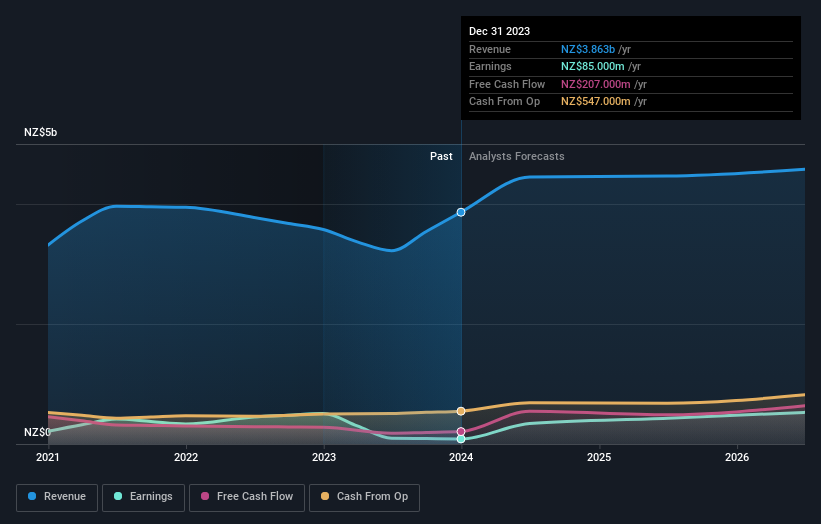Stock Analysis
- New Zealand
- /
- Renewable Energy
- /
- NZSE:MEL
Individual investors own 36% of Meridian Energy Limited (NZSE:MEL) shares but state or government control 51% of the company

Key Insights
- Significant control over Meridian Energy by state or government implies that the general public has more power to influence management and governance-related decisions
- The largest shareholder of the company is New Zealand with a 51% stake
- Insiders have been buying lately
A look at the shareholders of Meridian Energy Limited (NZSE:MEL) can tell us which group is most powerful. The group holding the most number of shares in the company, around 51% to be precise, is state or government. In other words, the group stands to gain the most (or lose the most) from their investment into the company.
And individual investors on the other hand have a 36% ownership in the company.
Let's take a closer look to see what the different types of shareholders can tell us about Meridian Energy.
Check out our latest analysis for Meridian Energy

What Does The Institutional Ownership Tell Us About Meridian Energy?
Institutional investors commonly compare their own returns to the returns of a commonly followed index. So they generally do consider buying larger companies that are included in the relevant benchmark index.
Meridian Energy already has institutions on the share registry. Indeed, they own a respectable stake in the company. This suggests some credibility amongst professional investors. But we can't rely on that fact alone since institutions make bad investments sometimes, just like everyone does. When multiple institutions own a stock, there's always a risk that they are in a 'crowded trade'. When such a trade goes wrong, multiple parties may compete to sell stock fast. This risk is higher in a company without a history of growth. You can see Meridian Energy's historic earnings and revenue below, but keep in mind there's always more to the story.

Meridian Energy is not owned by hedge funds. New Zealand is currently the largest shareholder, with 51% of shares outstanding. With such a huge stake in the ownership, we infer that they have significant control of the future of the company. The Vanguard Group, Inc. is the second largest shareholder owning 1.9% of common stock, and BlackRock, Inc. holds about 1.8% of the company stock.
While studying institutional ownership for a company can add value to your research, it is also a good practice to research analyst recommendations to get a deeper understand of a stock's expected performance. Quite a few analysts cover the stock, so you could look into forecast growth quite easily.
Insider Ownership Of Meridian Energy
While the precise definition of an insider can be subjective, almost everyone considers board members to be insiders. Company management run the business, but the CEO will answer to the board, even if he or she is a member of it.
Insider ownership is positive when it signals leadership are thinking like the true owners of the company. However, high insider ownership can also give immense power to a small group within the company. This can be negative in some circumstances.
Our most recent data indicates that insiders own less than 1% of Meridian Energy Limited. It is a very large company, so it would be surprising to see insiders own a large proportion of the company. Though their holding amounts to less than 1%, we can see that board members collectively own NZ$9.8m worth of shares (at current prices). Arguably recent buying and selling is just as important to consider. You can click here to see if insiders have been buying or selling.
General Public Ownership
The general public-- including retail investors -- own 36% stake in the company, and hence can't easily be ignored. While this group can't necessarily call the shots, it can certainly have a real influence on how the company is run.
Next Steps:
It's always worth thinking about the different groups who own shares in a company. But to understand Meridian Energy better, we need to consider many other factors. Take risks for example - Meridian Energy has 2 warning signs (and 1 which is significant) we think you should know about.
But ultimately it is the future, not the past, that will determine how well the owners of this business will do. Therefore we think it advisable to take a look at this free report showing whether analysts are predicting a brighter future.
NB: Figures in this article are calculated using data from the last twelve months, which refer to the 12-month period ending on the last date of the month the financial statement is dated. This may not be consistent with full year annual report figures.
Valuation is complex, but we're helping make it simple.
Find out whether Meridian Energy is potentially over or undervalued by checking out our comprehensive analysis, which includes fair value estimates, risks and warnings, dividends, insider transactions and financial health.
View the Free AnalysisHave feedback on this article? Concerned about the content? Get in touch with us directly. Alternatively, email editorial-team (at) simplywallst.com.
This article by Simply Wall St is general in nature. We provide commentary based on historical data and analyst forecasts only using an unbiased methodology and our articles are not intended to be financial advice. It does not constitute a recommendation to buy or sell any stock, and does not take account of your objectives, or your financial situation. We aim to bring you long-term focused analysis driven by fundamental data. Note that our analysis may not factor in the latest price-sensitive company announcements or qualitative material. Simply Wall St has no position in any stocks mentioned.

Simply Wall St
About NZSE:MEL
Meridian Energy
Meridian Energy Limited engages in the generation, trading, and retailing of electricity to residential, business, and industrial customers in New Zealand, Australia, and the United Kingdom.
Moderate growth potential with mediocre balance sheet.
